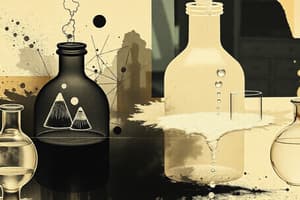Podcast
Questions and Answers
Flashcards are hidden until you start studying
Study Notes
Chemical Properties and Substances
- The ability of a substance to undergo a chemical change is a chemical property.
- A chemical property is a characteristic of a substance that can be observed or measured during a chemical reaction.
Composition of Substances
- Water is a compound made up of different elements.
- A compound is a pure substance formed from chemical combinations of two or more different elements.
Types of Substances
- A pure substance that cannot be broken down into any other substances by any chemical means is an element.
- An element is a pure substance that consists of only one type of atom.
Measurement of Physical Quantities
- The measure of gravity on an object is its weight.
- Weight is different from mass, which is a measure of the amount of matter in an object.
- The amount of space matter takes up is called volume.
- Volume can be measured in units such as liters or cubic centimeters.
Units of Measurement
- Mass can be measured in units called grams.
- Volume can be measured in units such as liters or cubic centimeters.
- The liter and cubic centimeter are both units used to measure volume.
Chemical Reactions
- In an endothermic reaction, energy is absorbed in the form of heat, not released.
Chemical Properties and Changes
- Chemical property: the ability of a substance to undergo a chemical change
- Chemical change: a process that alters the chemical composition of a substance
Substances and Elements
- Compound: a pure substance formed from chemical combinations of two or more different elements
- Element: a pure substance that cannot be broken down into any other substances by any chemical means
Measurement and Properties
- Mass: a measure of the amount of matter in an object
- Weight: the measure of gravity on an object
- Volume: the amount of space matter takes up
- Density: mass per unit volume of a substance
- Units of measurement: grams for mass, liters or cubic centimeters for volume
States of Matter
- Solid: particles are tightly packed and vibrate; has a definite shape and volume
- Liquid: takes the shape of its container; has a definite volume but not shape
- Gas: expands to fill the space available to it; has neither definite shape nor volume
Physical Changes
- Physical change: alters the form of a substance, but does not change it into another substance
- Examples: changes in state (solid to liquid, liquid to gas, etc.)
- Melting: change from solid to liquid
- Freezing: change from liquid to solid
Chemical Changes
- Chemical change: a process that alters the chemical composition of a substance
- Examples: burning gasoline produces carbon dioxide, lighting a match
- Chemical reaction: a process that involves a chemical change
Energy and Matter
- Thermal energy: energy of the motion of particles in a substance
- Mechanical energy: energy of motion or position of an object
- Potential energy: energy of an object due to its position or configuration
Atomic Structure
- Atom: the central core (nucleus) consists of protons and neutrons, surrounded by electrons
- Proton: positively charged particle in the nucleus
- Neutron: neutral particle in the nucleus
- Electron: negatively charged particle outside the nucleus
Studying That Suits You
Use AI to generate personalized quizzes and flashcards to suit your learning preferences.



